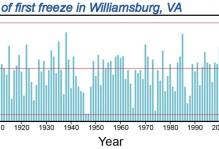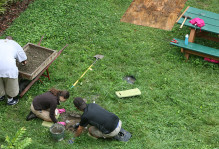People with real jobs
Over the years, I have invited many dozens of policy practitioners to make presentations to my classes at William and Mary. Examples include members of the U.S. Senate and House, sub cabinet level officials, senior congressional staff, and even a lobbyist or two. These folks do more than tell war stories to the students and add a bit of color to the gray confines of Morton Hall. Ideally, they demonstrate that the more abstract contents of my course readings and lectures actually have real world applications. Imagine that! They also help demystify the process. Students can see that highly successful policy professionals are really not all that different from them, that they are real people who are passionate about some issues and also occasionally make mistakes.
One of these policy practitioners has played a more sustained and important role at William and Mary – Lee Rawls. I first met Lee back in 1993 when I was on a leave of absence from the College, working as a congressional staffer. One of my staff colleagues was a close friend of his and knew that he was interested in doing some college teaching. We had lunch and it was apparent that he would be a great addition to William and Mary. Lee had worked as chief of staff to Senator Pete Domenici, as an aide to the Senate Committee on Environment and Public Works, and as assistant attorney general of the U.S. during the administration of George H.W. Bush. Since then he has served as chief of staff to Senator Bill Frist, chief of staff in the office of the Senate majority leader, and chief of staff to the director of the FBI. He also has a lot of experience in the private sector as partner in a major DC law firm and in government relations. I think you get my drift. There are very few people in our nation’s capital that have the range and depth of experience of a Lee Rawls.
Anyway, beginning in 1993 and pretty much every semester since then, Lee has taught a one-credit seminar course to W&M undergraduates. The course is entitled, “Congress, the Executive, and Public Policy,” and generally meets six or seven times for a few hours on selected Friday afternoons. We’re in the process now of setting up the course for this semester. Lee takes the train down from Washington and the meetings occur right here on campus in Morton Hall. The readings and course content have changed over the years, but it has always been a fascinating primer on legislative strategy, that is, on how to get things done in the real world of Washington politics.
I’ve learned a lot from Lee’s observations about the Washington political scene. But the key benefit has been to the half generation of William and Mary undergraduates who have been exposed to his insights. Needless to say, students clamor to gain admission to the class and evaluations are way off the charts. Indeed, my colleagues and I fear that he may be unrealistically raising the teaching bar for the rest of us. Lee has also personally placed a number of students in professional positions after graduation.
The bottom line? Lee Rawls doesn’t receive much credit or compensation for his efforts in Williamsburg. We haven’t given him “tenure.” But his contributions to the educational experience of hundreds of William and Mary students have been truly remarkable.




No comments.
Comments are currently closed. Comments are closed on all posts older than one year, and for those in our archive.